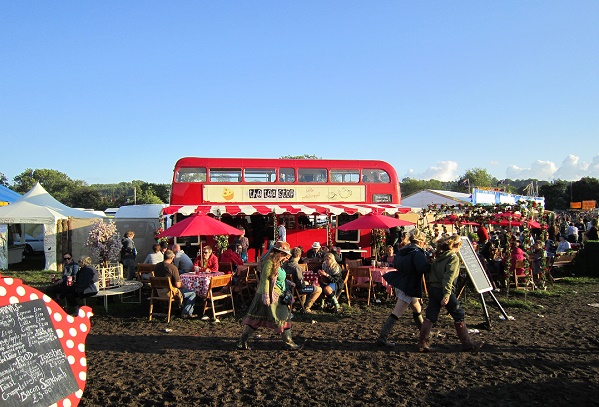
In mid-July in 2011 I visited Worthy Farm in Somerset, two weeks after Glastonbury Festival had come to an end. Wandering about its fields, so quickly turning back into a dairy farm after the pop-up city of the festival had gone away for another year, I saw a truck with a giant magnet trundling over the site to suck up tent pegs from the ground to ensure the cows didn’t hurt their hooves, teams of local volunteers taking down the stages and clearing up the litter, and the festival’s founder Michael Eavis, bumping across the site in his Land Rover and reflecting gloomily on the festival’s future.
“I’m so scared, personally,” he said, as the Land Rover stopped in a green expanse of nothingness that two weeks earlier, as the Pyramid Stage, held host to Beyonce, U2 and Coldplay. “We’ve probably got another three or four years. Honestly, it’s on the way out.”
Eavis wasn’t just talking about Glastonbury festival, but festivals in general.
“People have seen it all before with festivals,” he said. “They want something else. That year with Jay Z [he headlined in 2008] was so scary I was waking up on the morning with a cold sweat. I couldn’t get Radiohead, Coldplay, whatever, so we stuck our neck out and went for the Jay Z option. Then we had the Gallagher brothers saying this was a rubbish headline, everyone believed it and the culture spread. We sold 80,000 tickets on the first day when we normally sell 140,000, and then it just stopped. We could have lost six or seven million, and I haven’t got any money as such. I’ve got a farm but I don’t have a bean, really.”
Four years later, Eavis’s prediction might now be coming true. Glastonbury sold out within days of tickets going on sale this year, as it does in most years, but its own vast success could put paid to its future. The festival has expanded so much over the decades that much of the site occupies land Eavis doesn’t own, and the consequent negotiations with surrounding landowners have become so complex that this year Eavis suggested he may be forced to move the festival to a new site entirely. Meanwhile, less noble events than Glastonbury have struggled for a reason of their own making: VIP culture.
Hop Farm, set up as a rival to Glastonbury, has come to an end despite enticing such huge headline acts as Prince and Bob Dylan. This was the first festival I have ever been to where there was the option to pay £4 to use a decent toilet. V Festival in Essex and Leeds has a complex, brand-endorsed VIP system that leads up to a £2,700 option for a log cabin with fresh linen. The British Summertime concerts at Hyde Park have a VIP enclosure in front of the stage, which means fans buying a standard ticket are kept at a distance. At Coachella festival in the Colorado desert there are seventeen different types of VIP ticket available, with tickets going up to $899 sold on the suggestion that it will get you closer to the celebrities in attendance. Coachella also uses the cheap airline economic model to get people to pay more: offer a basic experience that’s awful — in Coachella’s case this means only being allowed to drink in designated pens — and force them to upgrade into an area heavily branded by one of the festival’s corporate sponsors.
VIP festival culture is designed to make you feel you are missing out, that you are something of a lesser being, but should you make it into one of these hallowed areas you’ll only find a bunch of people staring at their phones and each other, conscious of their own lack of egalitarianism. You’ll have more fun roughing it with your mates.
“There’s a lot of fake VIP bullshit happening at this festival,” said Win Butler of the Arcade Fire at this year’s Coachella. “But it super sucks in there so don’t worry about it.” One of the most comical examples I saw of VIP culture was at London’s Lovebox: not a bad weekend of dance music in itself, but there was an area in the middle of the site separated by hay bales where, for a fee, you could join in and show everyone what a good time you were having.
Glastonbury festival, the most successful of them all, is also the most egalitarian. The Eavises still run it on idealistic grounds, with minimal branding and with most of the profits going to charity. The hospitality area is small and not particularly interesting, which encourages people to get out there, explore the site, see bands and have fun. On that day with Michael Eavis I put it to him that having Camp Kerala, a £10,000-a-stay “Maharaja’s Palace” at the edge of the site was hardly in keeping with the festival’s hippy beginnings. He pointed out that Camp Kerala was run not by him but by a neighbouring farmer. “And besides,” he added, “why shouldn’t people stay in a bloody yurt or a Winnebago if they want to?”
No reason at all. There’s no reason why people shouldn’t be able to pay more if they want to stay in a ready-made tent, or a yurt, or even a bloody Winnebago. But the key to a successful festival is to not rub the ordinary punter’s nose in it, not to let the average school leaver turning up with a pop-up tent and a carton of Heineken feel they are missing out. Glastonbury understands this and keeps all luxury camping experiences discreet and out of view. Other festivals have let VIP culture become conspicuous and they are suffering accordingly.